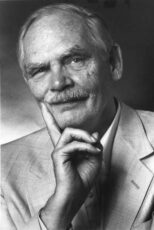 Frederik Pohl (1918-2013) recorded at the Octocon Science Fiction Convention, October 15-16, 1978. Interviewers: Richard Wolinsky, Richard A. Lupoff and Lawrence Davidson, for KPFA’s Probabilities radio program. Digitized, remastered and re-edited February, 2021 by Richard Wolinsky. This interview has not been heard in any form since 1978.
Frederik Pohl (1918-2013) recorded at the Octocon Science Fiction Convention, October 15-16, 1978. Interviewers: Richard Wolinsky, Richard A. Lupoff and Lawrence Davidson, for KPFA’s Probabilities radio program. Digitized, remastered and re-edited February, 2021 by Richard Wolinsky. This interview has not been heard in any form since 1978.
Frederik Pohl, who died in 2013 at the age of 93 in September, 2013, did almost everything in the world of science fiction, as a writer, an agent, and a magazine and book editor. He grew up in Brooklyn, began writing at an early age, and in his twenties was a member of a leftist group of science fiction writers known as The Futurians, publishing for pennies a word in the sf pulps of the era. In 1937, in order to make money, he became an agent, and two years later a pulp magazine editor himself, often buying his own stories along with collaborations with various other writers, all under pseudonyms. In the late 1960s, he became editor of Galaxy Magazine, and its sister publication, Worlds of If, and in the 1970s became the science fiction editor at Bantam Books which he left shortly before this interview.
In the mid 1970s, Fred Pohl emerged as one of science fictions pre-eminent novelists with Man Plus in 1976 and Gateway in 1977. In 1978, on the heels of novelist Damon Knight’s memoir, The Futurians, he came out with his own memoir, The Way the Future Was.
And that was where his career stood when the three of us interviewed him. We were all still new at interviewing, particularly in placement of the microphone.
Fred Pohl’s success continued for many years after this interview. Jem, published in 1979, won the National Book Award the only year there was an award for science fiction. The sequel to Gateway, Beyond the Blue Event Horizon was a finalist for both the Hugo and Nebula Awards in 1980. In all, there eventually were seven novels in the Gateway (Heechee) series, and after 1979, all told, he wrote 17 more novels, the last being The Lives He Led, published in 2011, along with several collections, even more collaborations, and some non-fiction as well. At the time of his death at 93 in 2013, he was working on a second memoir, which has to date not been published.
NOTES. Judy Lynn Del Rey was the sf editor at Ballantine Books starting in the early 1970s and soon had her own imprint, Del Rey Books (in collaboration with her husband, writer Lester Del Rey). Judith Merrill was a writer and anthologist, noted for her Year’s Best SF Stories collections, which she edited from 1956 to 1968. John Michel was a key member of the Futurians who never fulfilled his promise. John W. Campbell was the editor of Astounding Stories, later Analog, from 1937 into the 1970s, and is credited with discovering such writers as Isaac Asimov and Robert Heinlein. His influence on science fiction was all-encompassing, even as his politics were, as Isaac Asimov quipped, somewhere to the right of Hitler. Horace Gold was the first editor of Galaxy, before Fred Pohl. It was the magazine that brought literary style into science fiction. Other names mentioned are Anthony Boucher and F. Francis McComas, the first editors of the Magazine of Fantasy and Science Fiction, F&SF.



